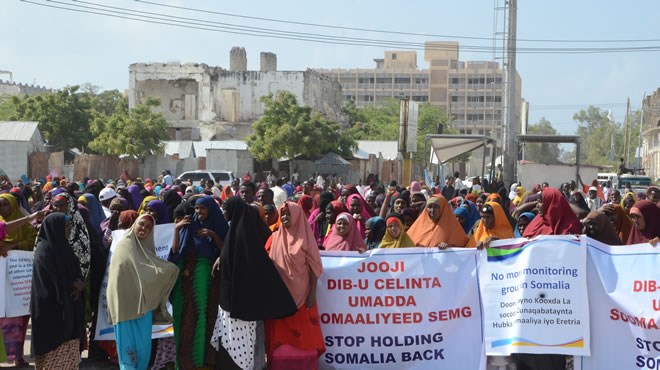By Warsame O. Hashi
Tuesday May 21, 2019

On November 14 2018 the United Nations Security Council passed a unanimous resolution 2444 (2018) under Chapter VII of the UN Charter in which it lifted the arms embargo, travel ban, assets freeze and targeted sanctions previously imposed on Eritrea, which the Council had imposed via resolutions 1907 (2009), 2023 (2011), 2060 (2012) and 2111 (2013). The lifting of the sanctions was as a result of new political developments in the horn in which Ethiopia’s Abiy Ahmed and Eritrea’s Isaias Afwekri agreed to bury their differences and restore diplomatic relationships.
The UNSC was categorical that the lifting of Eritrea’s sanctions was purely premised on the renewed rapprochement in the horn that significantly defused hostilities in the sub-region. By dint of the same resolution, the Council renewed its arms embargo on Somalia imposed by paragraph 5 of UNSC resolution 733(1992) that was modified in subsequent resolutions, at least until November 15 2019.
It is imperative to note that within the same resolution 2444(2018), the Council effectively ended the mandate of the infamous and ineffectual Monitoring Group that did virtually nothing credible to warrant any further renewal of its mandate. They did not help Eritrea in any way to find a political settlement to its longstanding differences with its brotherly neighbours. Throughout its lifespan, SEMG exhibited open bias and hostility to Somalia and Eritrea.
Repackaging the Vice
The same applies to the Somali situation. Somalia-Eritrea Monitoring Group (SEMG) which included former journalists continuously colluded with corrupt media outlets to tarnish the image of Somalia, playing into the hands of political perverts and vested interests. They have now morphed into what is duped ‘Panel of Experts’ who have regrettably been given another opportunity to further undermine Somalia’s recovery and reconstruction efforts.
The group is headed by a dubious entity with debatable integrity. Jay Bahadur has earned infamy for magnifying issues in Somalia as a result of which he has made a living. His misconducts represent a well-crafted pattern of deception and obfuscation to incessantly deny Somalia the chance to completely recover from its challenges. His insinuations heavily rely on concocted stories or hearsays that have no verifiable basis whatsoever.
Jay Bahajur is definitely a man on an immoral mission—he betrayed the trust of the Council by making assessments based on deliberately distorted facts. He lacks moral locus to preach anyone on what constitute morality owing to the strong indications that point to the existence of his camaraderie with abominable elements bent on disturbing peace and harmony in Somalia.
Not Value for Money
Bahajur and his disgraceful clique are not helping the United Nations in any way to make an informed decision on the subject matter. If anything, the group is serving overt interests that have connived to commercialize conflicts and are hell-bent on perpetuating it. It is about time when UN questioned the rational behind the continued engagement of this obsolete entity that has outlived its usefulness.
Under the current circumstances, the noblest thing to have done would be to disband them summarily and institute a body to investigate their illicit activities and association with suspected transnational criminal gangs. This is more relevant to Bahajur who was overly involved in well-documented acts of sabotage, extortion and blackmail. It is a common practice around the world to evaluate the performances of entities hired to accomplish certain tasks and terminate terms of service where the later has not be delivered.
One more dime must not be squandered on Bahajur and his team, as that would be akin to rewarding ineptitude and encouraging moral turpitude. The UN has a moral obligation to create conducive environment for Somalia in which the country may transit to a more stable socio-economic and political situation.
Renewed rapprochement in the horn must be met with commensurate encouragement from the UN and other stakeholders to act in such a way that the newly found momentum for regional integration is safeguarded covetously with a view to enduring the same. The similitude of an ill-armed and under-resourced national army is that of a weak immune system where the body becomes susceptible to opportunistic ailments. The gallant Somali National Army soldiers are equal to the task of liberating the country but need requisite military hardware to accomplish such virtuous endeavours. The arms embargo is denying Somalia weapons so dearly and urgently needed to arm security agencies to provide security to citizens. It is myopic to maintain sanctions and still expect to make tangible progress pertaining to Somalia’s peace and stability. Somalia has made marked improvement in recovery and reconstruction over the past two years. To ensure that this is maintained through domestically driven efforts, the international community needs to be more realistic in the way, manner and form in which it perceives and handles Somali issues.
God bless Somalia
Warsame O. Hashi is a security and development analysts. He can be reached Email:
[email protected], Twitter: @warsamehashi